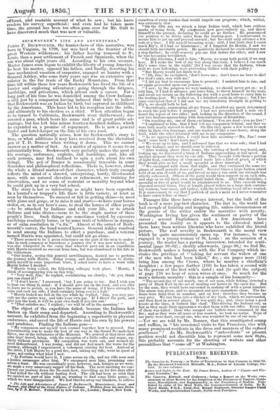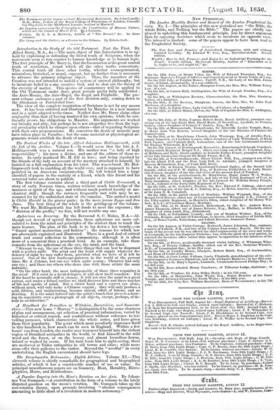PUBLICATIONS RECEIVED.
. • Booxs. The avonian in Norway ; or Notes of Excursions in that Country in 1854-'55. By the Reverend Frederick Metcalfe, MA., Fellow of Lincoln College, Ox- ford. In two volumes.
Scenes and Sights in the East. By James Bruce, Author of " Classic and His- toric Portraits," Be.
The Cauvery, Eistnah, and _Godamwy ; being a Report on the Works con+ structed on these Rivers for the Irrigation of the Provinces of Tanjore, Gnats moor, Masulipatam, and Rajahmundry, in the Presidency of Madras. Pub- lished by order of the Most Noble the Governor-General of India. By R. Baird -Smith, F.G.S., Lieut.-Col. Bengal Engineers, Director Ganges Cana Works, and Superintendent Canals, North-west Provinces.
The Treatment of the Insane without Mechanical Restraints. By John Conolly, M.D., Edin., Fellow of the Royal College of Physicians of London, Consult- ing Physician to the Middlesex Lunatic Asylum at Hanwell.
An Inquiry concerning the Principles in the Constitution of Human Nature, which are the Causes of Moral Evil. 1,,q a Layman. .Erelems. By E. L. A. Berwick, Author of " The Dwarf," &c. In three volumes.
The Camp and the Cutter; or a Cruise to the Crimea. By Edwin Galt.
Introduction to the Study of the Old Testament. Part the First. By Alfred Barry, M.A., &c.—The main object of this Introduction is to up- hold by explaining or defending the literal truth of Scripture, when the statements seem to run counter to human knowledge or to human logic. The first principle of Mr. Barry is, that the Incarnation is the great central truth of revelation, round which all the other truths concentrate. This central truth all these other truths, whether cosmogonomical, miraculous, historical, or moral, support, but no further than is necessary to advance the primary religious object. Thus, the narrative of the Creation was not intended to unfold a system of natural philosophy, but to inculcate belief in a one creative God, and to shut out the theory of the eternity of matter. This species of commentary will be applied to the Old Testament under three great periods pretty fully subdivided : the Ante-Mosaic, the Ante-Regal, the Regal and Prophetic. The pre- sent volume embraces a part of the first division only, coming down to the Abrahamic or Patriarchal time.
The view of the complete inspiration of Scripture is not by any means new. It has been enforced and illustrated by Maurice in a new manner and in a spirit adapted to the times. Neither does Mr. Barry claim other originality than that of having mastered his own opinions, while he con- tinually avows his obligations to Maurice. His arguments are worked out broadly and ably, but perhaps he is not altogether free from the logi- cal peculiarity which he charges upon others—that of regarding Scripture with their own prepossessions. He conceives the death of animals may have taken place in Paradise ; but the same material or physiological ar- guments would establish the death of man.
The Poetical Works of the late Alfred Johnstone Hollingsworth, with the Life of the Author. Volume I.—It would seem that the late A. J. Hollingsworth was a natural son. His mother was " a lady of high respectability "his tutor a divine, and one of the editors of these re- mains. In early manhood Mr. H. fell in love ; and being repulsed by the friends of the lady on account of the mystery attached to himself,he insisted on a full explanation from his tutor. This was refused. Mr. Hol- lingsworth took to rambling all the world over, and is supposed to have perished in an American emigrant-ship. He left behind him a large chestfull of papers in the custody of a friend, which this friend and his reverend tutor are about to publish. The first volume contains about a third part of Childe Ereonwold, a story of early Norman times, written without much knowledge of the manners or spirit of the age, and without much poetical faculty or me- chanical skill ; though the rawness frequently met with may be ac- counted for by the unfinished state of the remains. The author's model is Childe Harold in the graver parts ; in the more jocose Beppo and .Don Juan. The best thing of the whole is the getting-up of the volume. We trust Mr. Hollingsworth has left funds to meet the expenses ; the " division of the profits," we fear, will not trouble any one.
Aphorisms on Drawing. By the Reverend S. C: Malan, M.A.—Al- though not devoid of special direction, these aphorisms are more cal- culated to form the mind and principles of the student than to teach the mere learner. The plan of the book is to lay down a law tersely,—as " Guard against mannerism and fashion" • the reasons for which law are afterwards explained and illustrated. There is a good deal of critical truth and sound reflection in the commentary, although it is often more of a canonical than a practical kind. As an example, take these remarks from the aphorisms on the eye, the mind, and the hand.
"Strange to say, the one of those three things that can best be dispensed with is perfect sight. The mind and the hand will supply whatever de- ficiency of sight we may suffer from, provided what we have of it left be correct. One of the first landscape-painters in the world at the present time, Mr. A. Calame, lost one eye when quite young ; Chantrey had only one eye ; and there are others who share also with those artists the same infirmity. "On the other hand, the most indispensable of those three requisites is the mind. If it exist m a decided degree, it will show itself somehow. For if the hand be naturally stiff or clumsy, it will yet obey the mind to a great extent, and under a formal outline we shall discover here and there touches of and sparks of mind. But a clever hand and a correct eye alone, without mind, will only make a Chinese copyist ; they will only produce a cold, lifeless, and uninteresting, because unreal, effort of labour, and no drawing. It is the mind infused into the artist's touch that gives to a draw- ing its superiority over a photograph of all objects, except, perhaps, of de- tails in architecture."
A Handbook for Travellers in Wiltshire, Dorsetsleire, and Somerset- shire.—This new home " Murray " is distinguished by the same clearness of plan and arrangement, apt selection of practical information, varied by historical or critical remark, and readableness without reference to tra- velling purposes, which characterize the whole series, and have given them their popularity. The point which most peculiarly impresses itself in this handbook is, how much can be seen in England. Within a few hours' run from London, the reader may transport himself into the richest 'region of Druidical antiquities in the world, or find himself in the wild wood and the forest, or on the breezy and almost boundless downs, inland or washed by ocean. If his taste leads him to sight-seeing, there are mediaeval or Tudor antiquities in old towns and cities; while man- sions offer their galleries to the visitor. Beyond the "needful" in every undertaking, the English excursionist should have legs.
The Encyclopedia Britanniea ; Eighth Edition. Volume XI.—This eleventh volume is chiefly remarkable for geographical and biographical articles, of which it has a considerable number of use or value. Its principal miscellaneous papers are on Gunnery, Heat, Heraldry, Hiero- glyphics, Horse, and Horticulture.
A Popular Inquiry into the Moon's Rotation on her Axis. By Johan- nes Von Gumpach.—A contribution in the form of a volume to the lately disputed question on the moon's rotation. Mr. Gumpach takes up the non-rotation theory, upon grounds involving " ulterior consequences ;mounting to little short of a revolution in modern astronomy."
NEW PERIODICAL.
The London Monthly Review and Record of the London P'rophetical So- ciety. No. I.—The principles of this new periodical are " the Bible, the whole Bible, and Nothing but the Bible." The papers are chiefly em- ployed in upholding this fundamental principle, less by direct argument than by opposing doctrines which seem to inculcate an opposite view. The interest' is limited : some of the papers appear to have been read to the Prophetical Society.
The New Law and Practice of Joint-Stock Companies, with and without Limited Liability. By Edward W. Cox, Esq., Barrister-at-law. Second edition.
Wealth ; How to Get, Preserve, and Enjoy it; or Industrial naining for the People. Fourth edition. By Joseph Bentley, Author of " Education as it is, ought to be, and might Le," he.



























 Previous page
Previous page